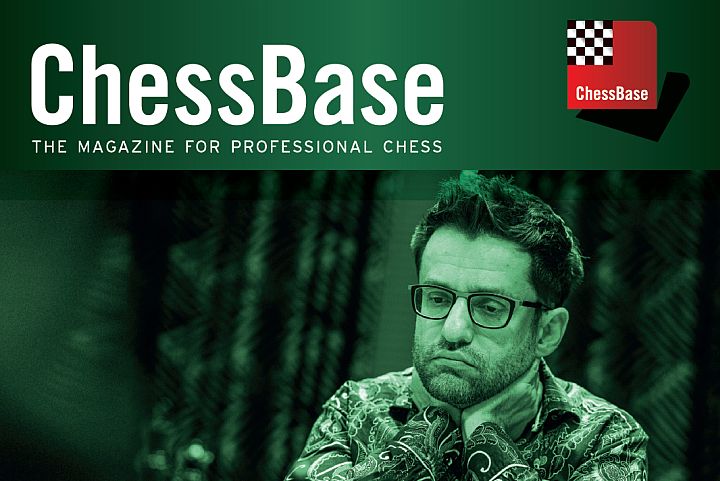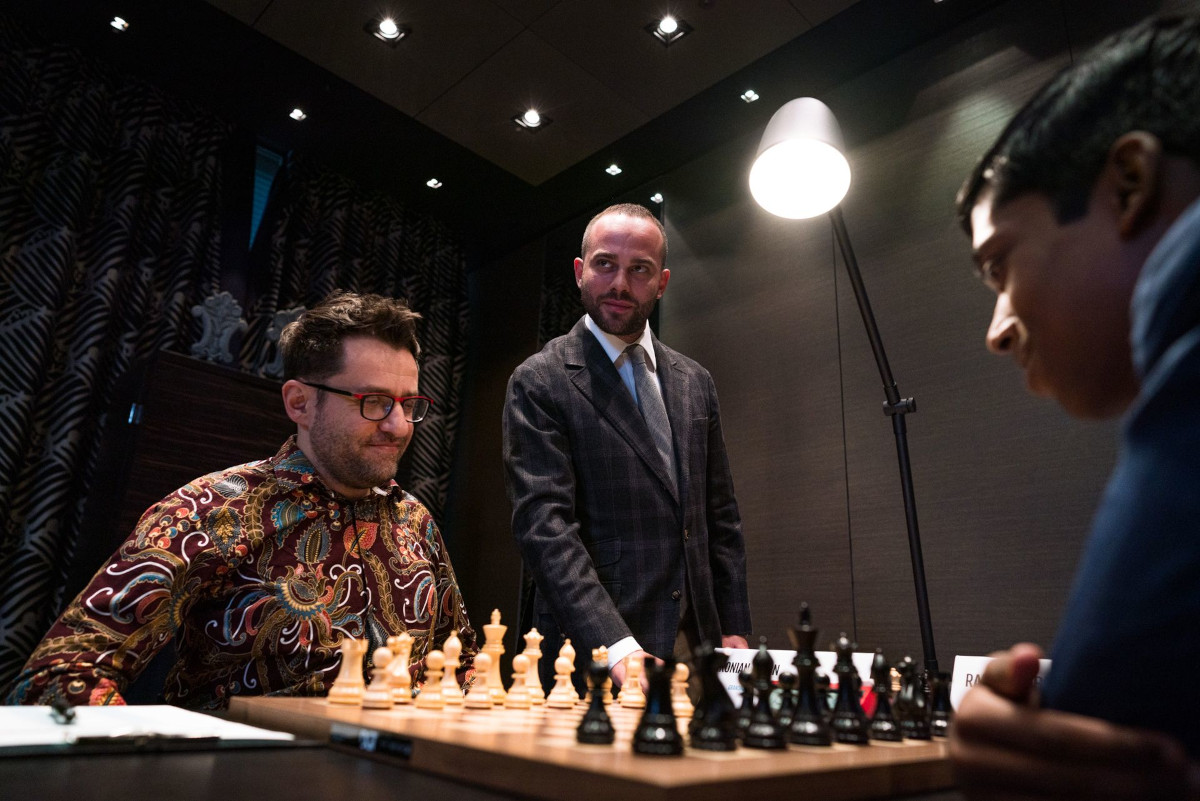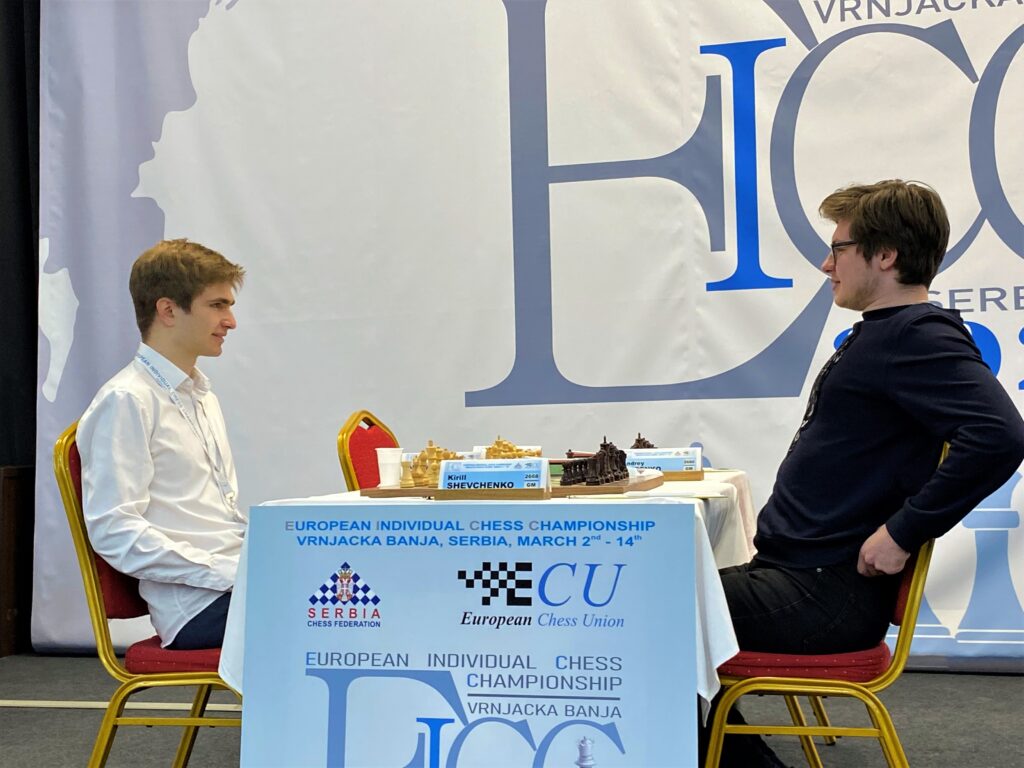


Review of the WR Masters 2023 with analyses from Aronian, Duda, Esipenko, Gukesh, Keymer and Praggnanandhaa. "Special" on Vishy Anand. Opening videos by Mendonca, Bauer and Marin. Opening articles from Caro-Kann to King's Indian and much more.
Aronian shines
Ever since Aronian settled in the USA, he has found a life ideal for his creative spirit. As he does not try to win every chess tournament, he is free from the anxiety of finishing at the top. It’s one of the reasons why he performed so well in the recent WR Masters Tournament and beat both Nepomniachtchi and Gukesh in the tie-break games to finish first. In this issue he annotates his games with Anish Giri and Praggnanandhaa.

Levon Aronian in the first round against Praggnanandhaa | Photo: Lennart Ootes
Levon has disarmimg modesty, "I always like to learn from young players" as he put it elsewhere in this issue. He is also curious about what his opponent thought during the game and readily shares his own ideas with the latter:
This part of the DVD also has a video commentary by Pragg on his game with Giri. There is also a video interview with Gukesh on his game with Pragg. Gukesh was unbeaten in the main event and he lost only one game to Aronian in the tie-break just as it was approaching a draw:

(Source: Chessbase India)
As a result of this game Gukesh came second in the tournament. Nepo’s mind seemed to be elswhere (the forthcoming world championship match that he subsequently lost) throughout the tournament. Yet he managed to finish third in this event which was arranged to give him practice for the title bout that awaited him.
Sarana scores
The European Individual Championship was a colourful event that drew as many as 484 players from the continent:
As is known, this strong event was won by Alexey Sarana who came ahead of Kirill Shevchenko and Daniel Dardha on tie-break after they had all finished with 8.5 out of 11 points.

Sarana and Shevchenko in the last round and they agreed to a quick draw. | Photo: Tournament page
In this issue Sarana annotates his game with Anton Korobov:
A tragic figure in this Championship was Anton Korobov.

Anton Korobov | Photo: Tournament page
He began with a score of 4/4 and then slowed down a bit until he lost this game to Sarana. He was still among the leaders until the last round when he met Daniel Dardha.

Daniel Dardha | Photo: Tournament page
Avoiding a draw at all costs Korobov overreached himself and lost. To his credit his young opponent kept cool under pressure and seized the opportunity to win:
War, politics and chess
One game that deserves attention is the 7th round encounter between Mikhail Kobalia (Russia) and Kirill Shevchenko (Romania):

Mikhail Kobalia (left) and Kirill Shevchenko | Photo: "Chess News without Censorship",
And thereby hangs a tale. According to Kobalia he arrived one or two minutes before the game and did not find his opponent at the table. The arbiter told him his opponent was already there and walking around somewhere nearby. Shevchenko came to the board only after his opponent had made the first move.When Kobalia offered a handshake Shevchenko declined the same. The offended GM called the arbiter and made an angry protest. The arbiter tried to mollify Kobalia, to no avail. The game continued and Kobalia was outplayed, leading to a striking finish. Here is the final phase of the game:
Kobalia could not accept defeat and made an official complaint to the Appeals Committee. Shevchenko was called for an explanation for his conduct before the game. At the end of the day the result of the game stood. Kobalia gave vent to his ire on the FaceBook, but received little support.
The two grandmasters had not known each other and so it was hadly on account of personal animus. The real reason had to do with the public positions both had taken. In fairness to Kobalia he had signed the appeal by 44 Russian GMs to stop the Ukraine war. He was also apalled by the war. When it began he wrote feelingly, "War is death, destruction, suffering... and there are no winners and losers in it, the losers are all... no words to describe my feelings.. this is a nightmare... which happens here and now…"
However, thereafter he has been a spokesman for the Russian Chess Federation to demand lifting the ban on the organisation and he has also been instrumental in obtaining membership of the Asian Chess Federation for the Russian chess body. As for Shevchenko, he was active supporting his motherland, Ukraine till he was forced to emigrate to Romania after a series of bombings on his native city.
By way of post script, I may add that Alexey Sarana, the winner of this Championship happens to be an outspoken critic of the Ukraine war and he has left Russia and settled in Serbia.
A Vishy Anand Special
This issue also carries a special feature on Anand with 26 annotated games. The opponents include world champions, Kasparov, Kramnik and Carlsen, not to mention GMs like Aronian, Timman and Ivanchuk among others. I did miss a few memorable encounters like his win over Kasparov in the 9th round of the World Championship 1995:
There are more than 4200 games of Anand in the BigBase alone. They are worth a look.
Opening videos and surveys
There are 3 opening videos in this issue:
The first offers an introduction to a rare line in the King’s Indian by young Leon Mendonca:
1.d4 Nf6 2.c4 g6 3. Nc3 Bg7 4. e4 d6 5.Nf3 0-0 6.Be2 Bg4!? (E91)
The second presents analysis of a line in the Open Catalan by Mihail Marin.
1.d4 Nf6 2. C4 e6 3. Nf3 d5 4.g3 dxc4 5.Bg2 c5 6. 0-0 Nc6 7.Ne5 (E04)
The third is a presentation on a line in vogue in the London System by Christian Bauer
1.d4 Nf6 2. Nf3 d5 3.Bf4 c5 4. e3 Nc6 5. Nbd2 Nh5 (D02)
Take your pick.
What is more, there are as many as 12 opening surveys ranging from the Caro-Kann to the King’s Indian. Among them I would single out the analyses on the Rubinstein Variation of the Four Knights Defence and a line for Black in the Carlsbad System.
An old line in the Four Knights
The Rubinstein Variation in the Four Knights often leads to big slugfest in the middlegame. On that score players with White used to avoid this variation in the past. Now a new line is being revived along with the older line 5.Ba4. This line, 5.Bc4 is examined by Martin Lorenzini in this issue. Newcomers unfamiliar with current theory and praxis may wonder why White cannot play the simple 5. Nxe5 and 6.f4 and get away with it. So here is that old line found in books, but seldom seen over the board:
A queen sacrifice in the Four Knights
The Carlsbad System countered
The other opening survey that I found fascinating was the writing by Lars Schandorff on a new line for Black in the Carlsbad System. As is known, this system has always been a formidable weapon for players with White ever since Botvinnik used it with success. The challenge before Black is how to neutralise White’s initiative. Lars Schandorff comes up with 9…Ne8!? a pradoxical retreat seen way back in Spielmann-Reti, Berlin 1928. In recent years Carlsen has also played it on account of a desire to experiment. Here is a model game by two Chinese grandmasters and I have kept the analysis simple so that novices can also follow:
Besides opening surveys, this issue has standard features on tactics, strategy and the endgame. Here I would single out Karsten Müller’s demo. lecture on king and pawn endings. He is lucid and it’s a treat to learn the final phase of the game from him.
Last, but not least, we have Jan Markos’ demo lecture on the topic, "How to play lost positions". Practical advice for the tournament player.
Summing up
The main database of the issue has 2651 games of which 47 are deeply annotated.There is much else in this DVD that deserves to be explored. Apart from the players I have already mentioned, the commentators include Ruslan Ponomariov, Jan Duda, Andrey Espipenko and Vincent Keymer among others.
It may be noted that there are more annotated games in the opening and training sections of this issue.
Well, practice makes perfect.
Notes:
1) Here is a link to the official site of the European Individual Championship:
2) There are several other interesting games from the European Championship in this issue. Here I would mention just two of them, Guliyev-Kollars and Nesterov-Gurel. The first game is long, and the mayhem begins after 35 moves. The second game also takes an astonishing course, and I was surprised to learn that the first 20 moves have a precedent in an earlier game, Kramnik-Van wely, Tilburg 1998.
3) GM Kobalia’s version of his encounter with Kirill Shevchenko is here:
4) The Russian chess site, "Chess News without Censorship" took a different view
Order now in the ChessBase Shop !
Try out ChessBase Magazine now! Order the ChessBase Magazine taster package!
Read ChessBase Magazine for 6 months (= 3 issues) for the special price of only 39.90 € (instead of 59,85 € for buying them individually). As a thank you, you will also receive 3 months ChessBase Premium Membership free of charge.
*Bonus for new subscribers only, i.e. there was no CBM subscription for 12 months!
Save twice with ChessBase Magazine: For the annual subscription to ChessBase Magazine you’ll pay only €99.70 per year (compared to €119.70 for the 6 individual issues).
* Bonus only for new subscribers, i.e. there was no CBM subscription for 12 months! As a new subscriber you will receive the original ChessBase USB stick with 128 GB
| Advertising |